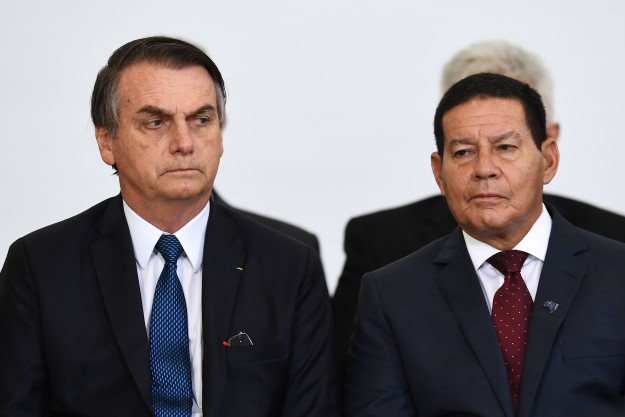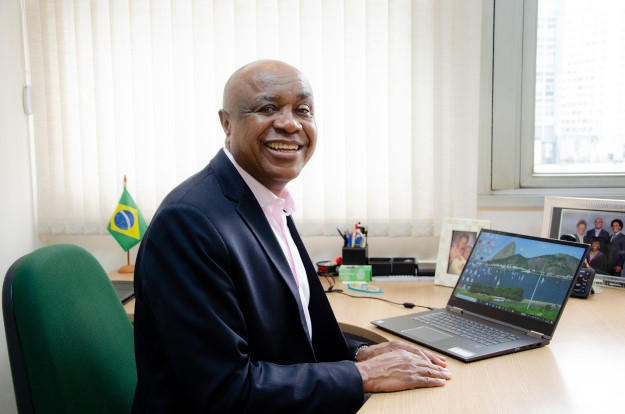After a little over one hundred days in power, President Jair Bolsonaro’s government is at war with itself, and the president is increasingly unable to control the factions close to him jockeying for influence. Amid the chaos – and with a disorganized opposition — an unexpected figure is working to keep the president in check: Hamilton Mourão, Bolsonaro’s own vice president.
Mourão has emerged as the leader of the generals in Bolsonaro’s administration, a role that’s put him at odds with Olavo de Carvalho, the Virginia-based conspiracy theorist and influential voice of the anti-globalist wing of Bolsonaro’s government. The anti-globalists are also regularly clashing with a third faction, the neoliberal economists around Economy Minister Paulo Guedes and the technocrats such as Justice Minister Sérgio Moro. The president is stuck in the middle of these three groups that helped him get elected, each with a contradicting vision of what his presidency should look like.
But Bolsonaro’s refusal to condemn Carvalho’s systematic social media campaign against Mourão and the other former generals in his cabinet — such as General Santos Cruz, one of Bolsonaro’s chief strategists — shows that, when in doubt, the president and his sons will side with the anti-globalists, the grouping closely associated with his die-hard supporters. This strategy, however, has already begun to erode the president’s support among the many moderates who voted for him last year.
Enter Mourão, who was largely seen as even more radical than the president during the presidential campaign last year. Sensing an opportunity, Mourão has undergone what looks like an ideological metamorphosis. He has been systematically courting moderates who feel abandoned, many of whom are supportive of the government’s law-and-order policies and pension reform, but who are horrified by the president’s frequent attacks on the media, academics and minorities and are uncomfortable with how his extreme right-wing rhetoric affects Brazil’s standing in the world.
Paradoxically, the opposition has been entirely unable to articulate a cohesive response to Bolsonaro that could attract centrist voters, and the Workers Party (PT), the largest opposition party, remains absorbed with overcoming the historic defeat at the polls last year, focusing on specific issues such as contesting former President Luiz Inácio Lula da Silva’s prison sentence and stubbornly — and somewhat inexplicably — maintaining friendly ties to Venezuela’s dictator Nicolás Maduro. Besides that, smaller opposition parties such as the PSOL (Socialism and Liberty Party) also prefer to focus on niche issues and do not currently seek to constructively lead on large matters like pension reform, corruption or public security.
In this context, outside observers rightly identify Mourão as a moderating force and a fire-fighter in the Brazilian government. He has been able to keep the president from making a series of potentially disastrous decisions, such as needlessly antagonizing China. Over the past months, Mourão has met with more foreign ambassadors than even Foreign Minister Ernesto Araújo (a key figure of the anti-globalist faction) in an effort to humanize Brazil’s image to the world and assure worried interlocutors that “sometimes the president has a rhetoric that does not go along with reality,” as he put it in an interview with the Financial Times.
Yet while Mourão has done much to protect the president, his many corrective measures have led him to contradict Bolsonaro so frequently that a growing number of hard-core Bolsonaro supporters now regard Mourão as a traitor who is overtly sabotaging his boss, plotting to replace him. Given Brazil’s recent history — as AQ editor-in-chief Brian Winter recently remembered, three out of five vice presidents have ended up occupying the presidency — moderate conservatives and even some progressives can nowadays be overheard expressing hope that Mourão will become the fourth VP to get the top job, a likelihood that seems all the more real considering Bolsonaro’s shaky performance so far.
Given how personal the attacks by anti-globalists against Mourão and his fellow generals have become, and how deafening the president’s silence has been in response, it seems unlikely that the relationship between Bolsonaro and his vice president can recover. In addition, the fundamental ideological differences between the two when it comes to key issues such as democracy itself have become so glaringly obvious that any demonstration of agreement would be unconvincing.
When Bolsonaro visited Israel and planned to announce the transfer of the Brazilian embassy from Tel Aviv to Jerusalem, tension between the two reached unprecedented heights after Mourão had publicly contradicted the president numerous times and promised that the move would not take place. In a humiliating move, Bolsonaro backed down, but given the many difficult decisions ahead – including vis-à-vis China and Venezuela — the president himself may soon rebel against the man who international diplomats refer to as the “adult in the room”. The problem for Bolsonaro, however, is that unlike Donald Trump, who quickly sacked his moderate generals, Mourão cannot be removed, to the chagrin of the Bolsonaro family.
Even though Mourão has gone so far as to publicly support a woman’s right to decide to have an abortion, enraging religious conservatives in the government, it would be an exaggeration to say that Mourão is a progressive’s dream. During his recent debate at the Brazil Conference at Harvard University, he seemed to question whether climate change was man-made. Despite his remarkable conversion, many will not forget that Mourão was long known as a radical who was sacked by former President Michel Temer after the general had suggested, among other things, that the armed forces would have to “impose a solution” if those guilty of corruption were not punished. Yet few doubt that Mourão is uniquely well positioned to take the reins if needed. “Mourão is in no rush, but he can eat Bolsonaro for dinner whenever he thinks the time is right,” a Brasília insider and former government official recently told me. Rather than actively scheming, the former general may just have to sit back and watch an inexperienced president stagger towards the abyss.








